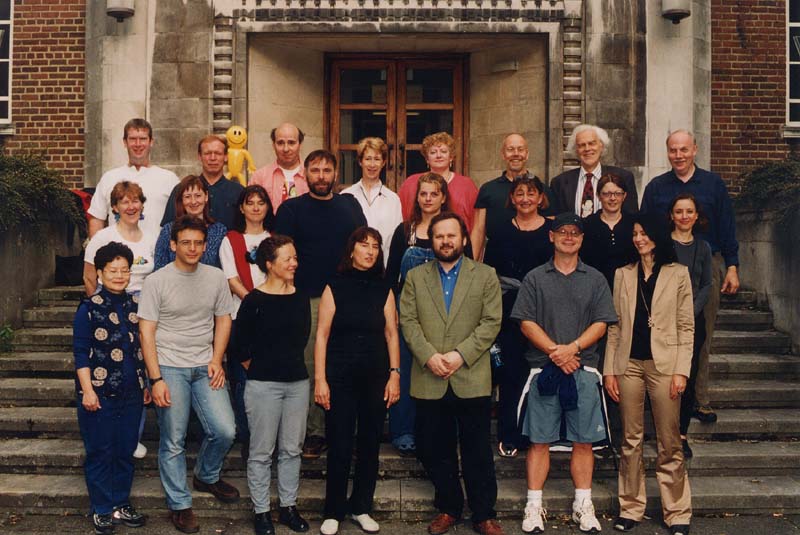

Missing (on pricture): Alex Gasperoni (Italy), Ulli Amrehn (Germany), Edelle McMahon (Northern Ireland), Birgit Herzberg Johnsen (Norway), Maria Almeida (Portugal), Jason Goodson (USA), Stein (USA), John Dinsmore (Northern Ireland), Joanne Wilson
The 1st International Summer School and Colloquium on Humour and Laughter: Theory, Research and Applications, endorsed by the ISHS, was held from Monday 25th June through Saturday 30th June 2001 in the School of Psychology at Queen's University of Belfast, Belfast, Northern Ireland, UK.
The course had three goals: the first was to provide a general background of theories and findings in the general fields of humor and laughter. It consisted of units such as: What is Humour? Universality of Facial Expression, Evolution of Smiling, Laughter and Humour, Development of Humour in Children, Morphology and Dynamics of Smiling and Laughter and Theories of Humour. The second goal was to cover research issues, to introduce methodology basic to humor research and to provide an overview of current hot topics in humor and laughter research. Units covered were Learning the Basics of the Facial Action Coding System-FACS, The Sense of Humour: Approaches and Measurement, The Comparative Study of Jokes (Christie Davies) and Humour, Laughter and the Brain (Barbara Wild & Frank A. Rodden). The final objective was to cover applied issues, and to familiarize students with practical applications of humour and laughter in a variety of settings. The major units of this segment, taught by Paul McGhee, were: Humour and Health, Humour Skills Training Programme, and Humour in the Workplace.
This summer school attracted 30 participants from all over the world who engaged in lively discussions. Successful applications came from Canada, Denmark, England, France, Germany, Hong Kong, Italy, Northern Ireland, Norway, Portugal, Republic of Ireland, Scotland, Taiwan, Republic of China, and USA. Participants came from such diverse academic disciplines as: Psychology, Applied Computing, Chinese Literature, Cultural Studies, Education, Mathematics, Management studies, Linguistics, Philosophy, Neurology, Cognitive Science, Psychiatry, Neurosurgery, and Folklore. The student body consisted of undergraduates, postgraduate and postdoctoral researchers, and university faculty members, as well as professionals (teacher, consultant, clinical psychologist, health professional, professional clowns working in the area of therapeutic laughter).
On Saturday 30th June 2001 a colloquium was held in which participants presenting their research work. The program comprised the following 10 presentations.
Course evaluations indicated that participants had not only gained much useful information but had also appreciated the chance to meet others with an interest in humor research (for a pfd-file with course evaluations by participants, click here). Despite the tight schedule of 6 hours of lectures per day, participants made time for social events. The social program included a welcome reception on Monday evening by officials of the university, and an excursion to Giant's Causeway and Cushendun on Wednesday afternoon. On Thursday evening a conference dinner was held in the historic and recently restored Great Hall in the main building of the university. The dinner was attended by members of staff of the School of Psychology and representatives from the university. Rumor had it that several other exciting social gatherings took place outside the auspices of the school. An Internet discussion group was implemented at Yahoo for the follow-up debates, social exchange, and discussions of research plans.
The summer school received considerable attention by the local and national media. International coverage was provided by a documentary produced by Annemieke Smit from VPRO-television, a public television channel. She and her Dutch TV crew filmed the school's progress and produced a 25-minute science show on humor and laughter. The report was broadcasted on September 6th as part of their weekly science program, called Northern Lights.
The summer school was organized by Willibald Ruch, with the help of the QUB-staff members James Campbell, Rhiannon McCready, Lynne Spence, and Geoff Caves; QUB-students Joanne Wilson and John Dinsmore assisted during the classes. Teaching faculty were Drs. Willibald Ruch (Queens University Belfast) and Paul McGhee (Wilmington, USA), with the additional guest teachers Dr. Christie Davies (Department of Sociology; University of Reading, UK), Dr. Frank A. Rodden (Department of Neuroradiology, University of Tübingen), and Dr. Barbara Wild (Department of Psychiatry, University of Tübingen). Encouraged by the evident success of the course, plans are underway for coming years' events.
Willibald Ruch
Queens University Belfast
w.ruch@qub.ac.uk
Last updated: Sept 11, 2001 visitors since Sept 1, 2001